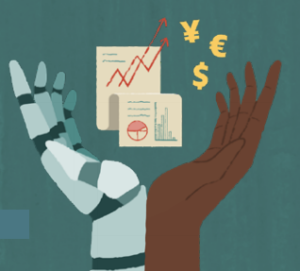By Jeff Domansky, Feb 10, 2021
As someone who writes about payments, finance, and fintech, a new research report from Oracle caught my eye and jarred my not-so-artificial intelligence.

Oracle’s research team surveyed 9,001 global consumers and business leaders from 14 countries about their attitudes and behaviors towards money, finances, budgets, and the role and expectations of artificial intelligence (AI) and robots in financial tasks and management.
I hope you’re sitting down because a few of their findings about finance will tip you over in your office chair. Here are just a few gems that will give fintech payments and financial pros both pause and incentive and inspiration.
Trust in humans is broken
Apparently, when it comes to money and our investments, our trust in humans is precariously on the edge:

- 67% of people would trust robots more than humans to manage finances
- 59% say they would trust a robot with finances more than themselves
- 85% of people believe robots will replace finance professionals
- 45% believe robots will replace finance professionals by 2026.
For consumers and their financial advisors, the research is a sharp criticism of where things are today – 63% of consumers would trust robots more than their personal financial advisors.
Consumers are also looking to robots to free up more time (33%), reduce unnecessary spending (31%), and increase on-time payments (25%).
Many new consumer fintech products and services such as robo-advisor services for investment reflect these desires, as we’ve covered here on PaymentsNEXT.
COVID colors concerns and attitudes
Oracle and its survey partner Savanta researched between November 10 – December 8, 2020. The results reflect consumer and business leader concerns about COVID-19.

Fiscal anxiety and sadness among consumers and business leaders more than doubled in 2020. 100% of consumers saw increased anxiety and stress due to the pandemic, while business leaders expressed an increase of 186% in anxiety and stress.
“Managing finances is tough at the best of times, and the financial uncertainty of the global pandemic has exacerbated financial challenges at home and work,” said Farnoosh Torabi, personal finance expert and host of the So Money podcast.
Over three-quarters of consumers (87%) said they were suffering from various degrees of financial anxiety, and 41% said financial stress is keeping them awake at night.
AI impact on business leaders
The results are interesting when you look at the attitudes of business leaders.
“The reality right now is that a staggering 77% of business leaders admit to having more trust in robots than in their own finance teams for help with financial-related tasks. And it’s a very similar situation in our personal lives. A majority of consumers (63%) stated that they would trust robots more than their personal financial advisors to effectively manage their financial affairs,” the report says.

Business leaders surveyed have sipped the AI Kool-Aid even more than consumers:
- 80% of business leaders would trust a robot to manage their organization’s finances, including detecting fraud (34%), creating invoices (25%), and doing cost-benefit analysis (23%)
- nearly all business leaders (90%) think robots will replace finance teams in the future.
- (56%) think it has already happened or will do so in the next five years.
“Robots are well-positioned to assist – they are great with numbers and don’t have the same emotional connection with money. This doesn’t mean finance professionals are going away or being replaced entirely, but the research suggests they should focus on developing additional soft skills as their role evolves,” Torabi says.
Many organizations (51%) have already implemented AI for fraud detection, invoicing, payments, data analysis, and finding inconsistencies among travel expense reports.
During the pandemic, interest, adoption, and utilization of fintech and artificial intelligence accelerated. What’s unclear is what the new mix of AI and human interaction will look like in the next five years.
What do business leaders want from AI?
It’s hardly surprising that fintech innovation, new products, and services are booming when 85% of business leaders want help from a robot.

The top four tasks where business leaders want AI support include approvals (43%), budgeting and forecasting (39%), reporting (38%), and compliance and risk management (38%).
Fortunately, business leaders still trust finance teams more than robots for some tasks such as communicating with customers (40%), negotiating discounts (37%), and approving transactions (31%).
But those damn robots are getting better and better at these tasks every day.
AI and fintech innovation
Just for the record, this post was not written by an AI journalism bot, and no robots were harmed while writing this post. Humans can still do some things better than AI – for the moment.
All kidding aside, in 10 months, COVID-19 has accelerated the typical product development, launch, and adoption cycle of some new online products and services from 10 years to less than 10 months. That includes COVID vaccines.

“Digital is the new normal, and technologies such as artificial intelligence and chatbots play a vital role in managing finance. Our research indicates that consumers trust these technologies to accelerate their financial well-being over personal financial advisors and business leaders see this trend reshaping the role of corporate finance professionals,” says Juergen Lindner, senior vice president, global marketing, Oracle.
“Organizations that don’t embrace these changes risk falling behind their peers and competitors; hurting employee productivity, morale, and well-being; and struggling to attract the next generation of AI-empowered finance talent,” adds Lindner.
It’s all happened at breakneck speed, with impressive innovation and surprising investment with a swift ROI.
I think even robots and starship USS Enterprise first officer Spock would agree that humans still add a little something to the always-available speed, accuracy and rational decision-making, and data-crunching insights of AI. For now.
You can read more about Oracle and market research firm Savanta’s Money and Machines: 2021 Global Study here.
Visuals courtesy of Oracle








LET’S CONNECT